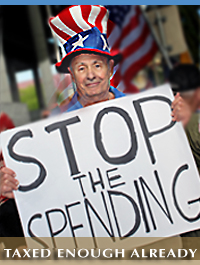| Freedom on the March in 2010? |
 |
|
By Sam Batkins
Wednesday, January 06 2010 |
When the clock struck midnight on January 1, some might have asked if the state of the nation could get any worse. Clearly, 2009 was a year to forget, and 2008 wasn’t much better. Millions of Americans have lost their jobs over the past two years in the wake of the worst economic recession in generations and the nation witnessed an unprecedented expansion of government power. The federal government nationalized the banking and financial industries, raised taxes and borrowed and spent trillions of dollars. And now, Washington is prepared to take over the health care industry, one-sixth of the economy. Fortunately, however, freedom appears to be on the march. After all, there is always reason to be hopeful in America, even if dour headlines and politicians continue to drain our vitality. Among the good news: the Death Tax will not be collected in 2010. The bad news: this is only because the Senate was too busy ramming through a government-run takeover of health care to bother raising the Death Tax this year; the tax will likely return in 2011. But regardless, taxpayers can enjoy a modicum of temporary tax relief, and smile knowing that children and heirs mourning the loss of loved ones won’t be penalized by this illogical and destructive tax. Just as temporary Death Tax relief offers some tangible reward, there are other potential milestones that could inspire a sense of optimism. The year 2010 is a midterm election year, which typically punishes incumbent politicians. This is generally good news for taxpayers, as midterms traditionally bring about a return to divided government, or at least a serious blow to the party in power. With divided government comes gridlock. And, with gridlock comes less government, or at least less expansive government. For taxpayers looking for more than just “divided government” as a catalyst for optimism in the new decade, the November election also offers voters the first chance (on a federal level) to remind politicians that humility is a virtue, arrogance a vice. For more than two years, politicians in both parties have ignored taxpayers and voted for trillions of dollars in bailouts, higher taxes and increased the national debt to more than $12 trillion. Even if the Tea Party movement hasn’t already inflicted humility and fear (it should have), then the November election would be a good time to remind the politicians in Washington that liberalism’s advance will soon retreat, just as it did in the ‘60s and ‘80s. Hopefully this time, the retreat will be as drastic and severe as the federal government’s preceding advance. No longer should taxpayers tolerate piecemeal reform. Appointing a commission to study “waste, fraud and abuse” won’t suffice for the alternative. Rather, what is necessary is a widespread restructuring of the federal government, namely making it smaller and reducing its power. Just as government expanded exponentially in the last decade, so should it retract in the coming decade. Uncontrollable entitlements, government meddling in personal health care decisions, Soviet-style agricultural policy and wasteful pork-barrel spending must be radically reformed or better yet, eliminated, in the next decade. Of course, legitimate threats stand in the way of these possible achievements. The wretched legislative inspiration known as Cap-and-Trade could effectively tax and regulate all carbon output in the U.S., and its passage still ranks high on the agendas of both the President and his party in Congress. In addition, a government takeover of health care may pass by razor-thin margins, and tax hikes are always on the agenda for politicians who think Americans don’t already pay enough to Uncle Sam. Government might be advancing today, but freedom can resume its march in 2010 if taxpayers make their voices heard at town hall meetings, over congressional phone lines, through letters, faxes, emails and most important of all, at the ballot box. Every victory for freedom will be welcome in 2010, but liberty will not flourish until the American people decisively instruct politicians that they derive their power only from the “consent of the governed.” Let us set freedom on the march in 2010. |
Related Articles : |
























